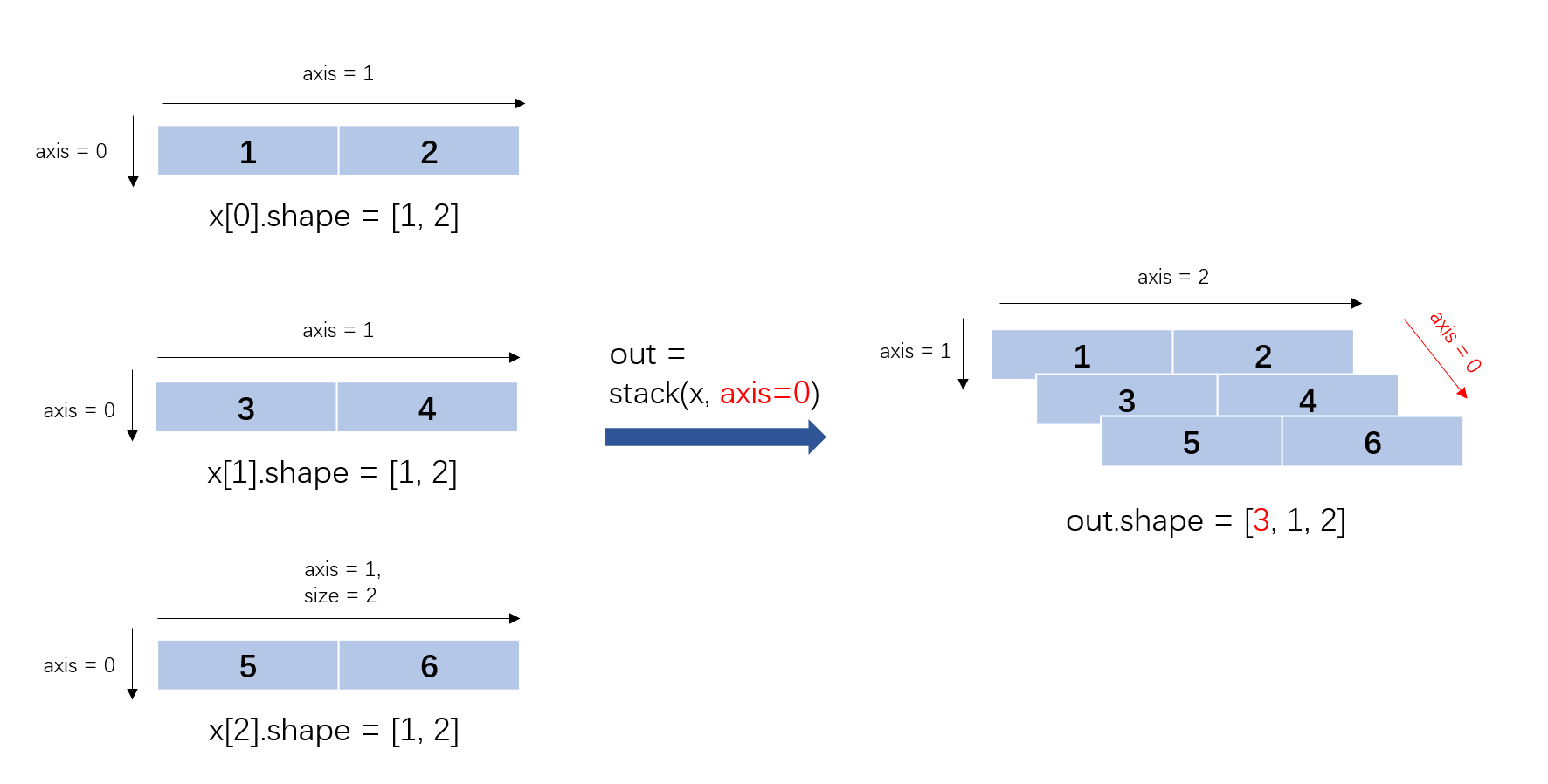stack
- paddle. stack ( x: Sequence[Tensor], axis: int = 0, name: str | None = None, *, out: Tensor | None = None ) Tensor [source]
-
Stacks all the input tensors
xalongaxisdimension. All tensors must be of the same shape and same dtype.For example, given N tensors of shape [A, B], if
axis == 0, the shape of stacked tensor is [N, A, B]; ifaxis == 1, the shape of stacked tensor is [A, N, B], etc.It also supports the operation with zero-size tensors which contain 0 in their shape. See the examples below.
Case 1: Input: x[0].shape = [1, 2] x[0].data = [ [1.0 , 2.0 ] ] x[1].shape = [1, 2] x[1].data = [ [3.0 , 4.0 ] ] x[2].shape = [1, 2] x[2].data = [ [5.0 , 6.0 ] ] Attrs: axis = 0 Output: Out.dims = [3, 1, 2] Out.data =[ [ [1.0, 2.0] ], [ [3.0, 4.0] ], [ [5.0, 6.0] ] ] Case 2: Input: x[0].shape = [1, 2] x[0].data = [ [1.0 , 2.0 ] ] x[1].shape = [1, 2] x[1].data = [ [3.0 , 4.0 ] ] x[2].shape = [1, 2] x[2].data = [ [5.0 , 6.0 ] ] Attrs: axis = 1 or axis = -2 # If axis = -2, axis = axis+ndim(x[0])+1 = -2+2+1 = 1. Output: Out.shape = [1, 3, 2] Out.data =[ [ [1.0, 2.0] [3.0, 4.0] [5.0, 6.0] ] ] Case 3: Input: x[0].shape = [0, 1, 2] x[0].data = [] x[1].shape = [0, 1, 2] x[1].data = [] Attrs: axis = 0 Output: Out.shape = [2, 0, 1, 2] Out.data = [] Case 4: Input: x[0].shape = [0, 1, 2] x[0].data = [] x[1].shape = [0, 1, 2] x[1].data = [] Attrs: axis = 1 Output: Out.shape = [0, 2, 1, 2] Out.data = []The image below demonstrates the Case 1: three 2-dimensional tensors with shape [1, 2] are stacked in the dimension of axis=0 to form a 3-dimensional tensor with shape [3, 1, 2] .
- Parameters
-
x (list[Tensor]|tuple[Tensor]) – Input
xcan be alistortupleof tensors, the Tensors inxmust be of the same shape and dtype. Supported data types: float32, float64, int32, int64. Alias:tensors.axis (int, optional) – The axis along which all inputs are stacked.
axisrange is[-(R+1), R+1), whereRis the number of dimensions of the first input tensorx[0]. Ifaxis < 0,axis = axis+R+1. The default value of axis is 0. Alias:dim.name (str, optional) – Name for the operation (optional, default is None). For more information, please refer to api_guide_Name.
out (Tensor, optional) – The output tensor. If set, the output will be written to this tensor.
- Returns
-
Tensor, The stacked tensor with same data type as input.
Examples
>>> import paddle >>> x1 = paddle.to_tensor([[1.0, 2.0]]) >>> x2 = paddle.to_tensor([[3.0, 4.0]]) >>> x3 = paddle.to_tensor([[5.0, 6.0]]) >>> out = paddle.stack([x1, x2, x3], axis=0) >>> print(out.shape) [3, 1, 2] >>> print(out) Tensor(shape=[3, 1, 2], dtype=float32, place=Place(cpu), stop_gradient=True, [[[1., 2.]], [[3., 4.]], [[5., 6.]]]) >>> out = paddle.stack([x1, x2, x3], axis=-2) >>> print(out.shape) [1, 3, 2] >>> print(out) Tensor(shape=[1, 3, 2], dtype=float32, place=Place(cpu), stop_gradient=True, [[[1., 2.], [3., 4.], [5., 6.]]]) >>> # zero-size tensors >>> x1 = paddle.ones([0, 1, 2]) >>> x2 = paddle.ones([0, 1, 2]) >>> out = paddle.stack([x1, x2], axis=0) >>> print(out.shape) [2, 0, 1, 2] >>> print(out) Tensor(shape=[2, 0, 1, 2], dtype=float32, place=Place(cpu), stop_gradient=True, [[], []]) >>> out = paddle.stack([x1, x2], axis=1) >>> print(out.shape) [0, 2, 1, 2] >>> print(out) Tensor(shape=[0, 2, 1, 2], dtype=float32, place=Place(cpu), stop_gradient=True, [])

